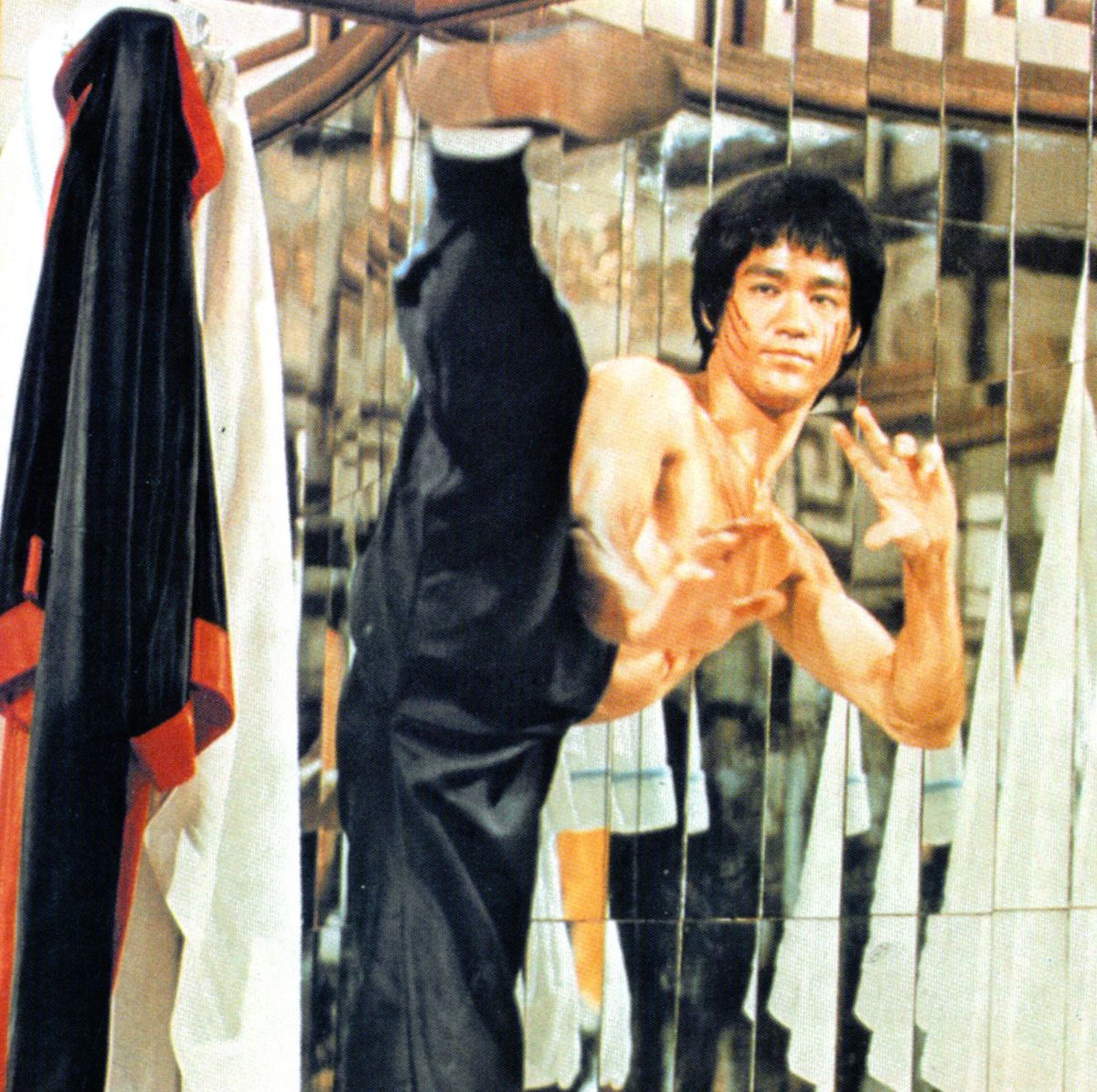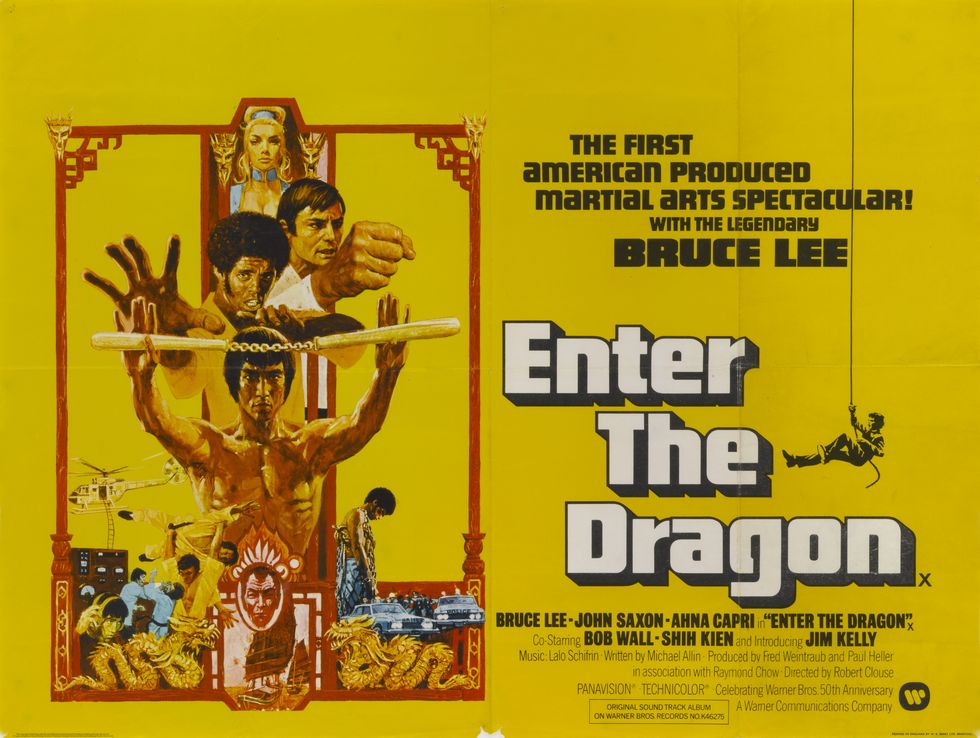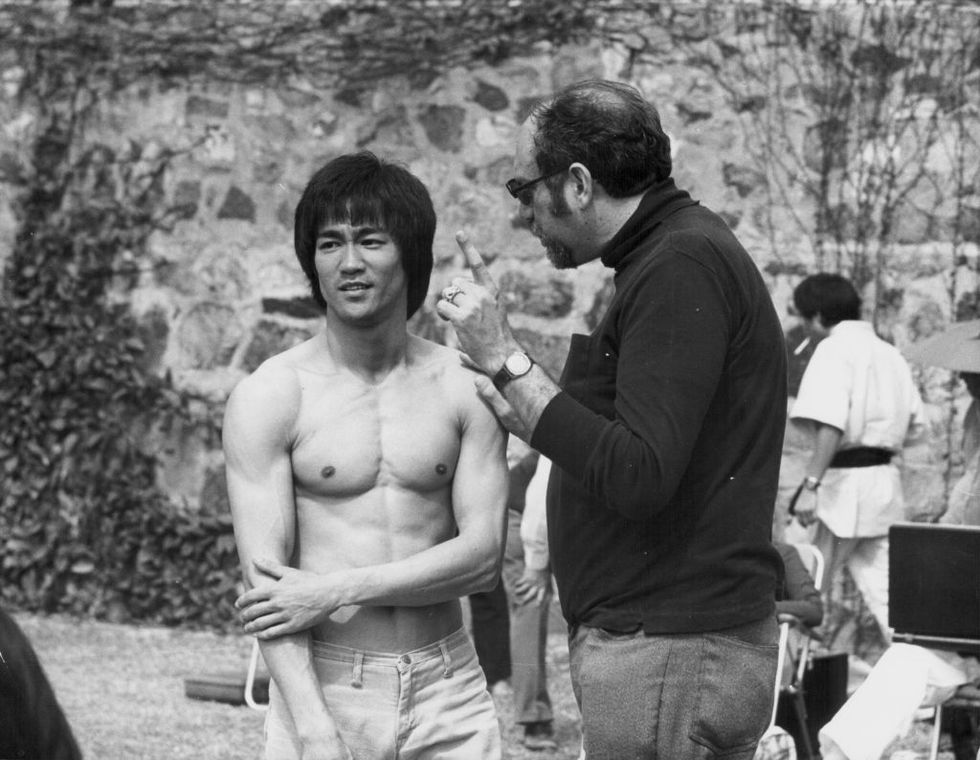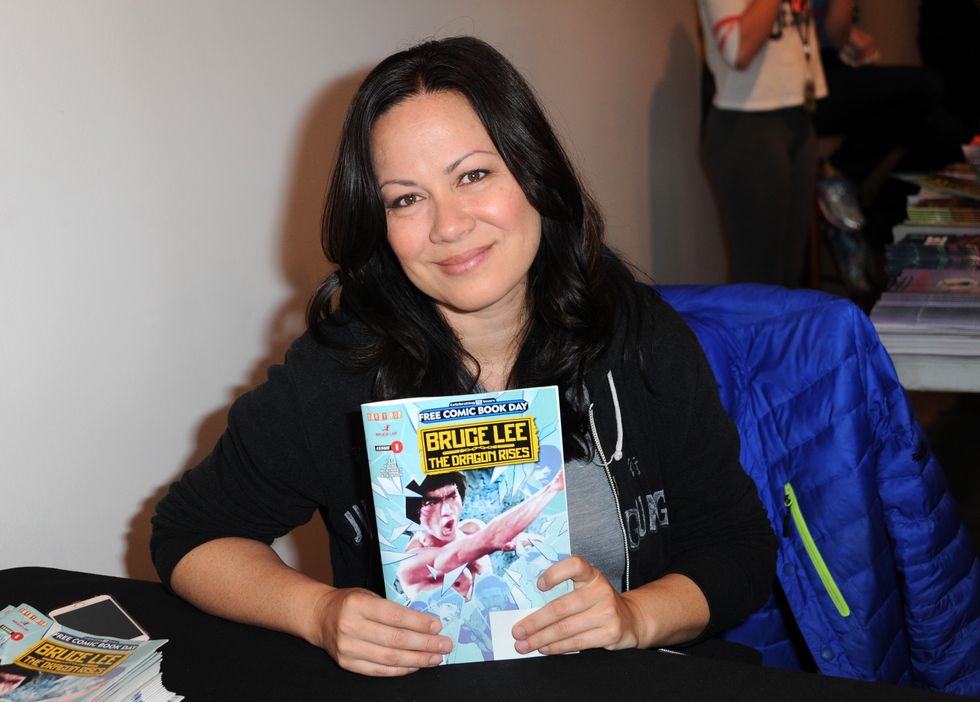Bruce Lee was a god amongst men. He commanded impossible strength, charisma, and vigour—and Enter the Dragon captured it all on celluloid for posterity. When the film hit theatres in August 1973, action cinema changed forever; its awesome might only added to its leading man’s evergreen mystique. But Lee never had the chance to witness Enter the Dragon's impact. He died of a cerebral edema at the age of 32, a month before the movie’s release. Fifty years later, Enter the Dragon still spellbinds audiences—especially Lee's daughter, Shannon, who tells me she loves merely listening to the film.
“It’s his own voice in the film, as opposed to being dubbed over," she explains over recent video call. "It holds a special place in my heart just in terms of connecting with my father.” Of all of Lee’s films, including Fist of Fury, The Game of Death, and The Way of the Dragon—with its all-time showdown between Bruce Lee and Chuck Norris—Shannon says that his visage in Enter the Dragon is “the closest [thing] to the father that I knew.”
As Enter the Dragon celebrates its 50th anniversary—and cinemas across the globe hold screenings of the film—Shannon is reflecting on the movie that made her father famous everywhere. “This may sound self-serving, but I think it’s because of Bruce Lee the movie is phenomenal,” Shannon says, believing her father’s performance is timeless amidst the era's abundance of funky '70s kitsch. “He still electrifies and jumps off the screen, and is just so badass. It’s a fun movie—and he brings the fun.”
On August 17, 1973, Enter the Dragon swept its competition to become one of the highest-grossing movies of the year. A spy film in the style of a James Bond adventure, Lee plays a secret agent who infiltrates a martial-arts tournament on an exotic island to take down a criminal mastermind. Adjusted for inflation, Enter the Dragon grossed $150 million (around £120 million) in 1973. The number isn't too shabby, considering Enter the Dragon faced stiff competition from other artistic giants such as Westworld, American Graffiti, The Sting, and The Exorcist.
“What Enter the Dragon had was something nobody in the West had seen before. Nobody had seen martial arts action like that before, and certainly not in Hollywood,” Shannon, 54, says of her father’s film. Before Lee, kung fu movies—which enjoyed cult popularity in the United States, often playing in grimy double-bill theatres—boasted flashy gymnastics and impossible superhuman abilities. Utilising his discipline and philosophy of Jeet Kune Do, widely considered the forerunner to modern mixed martial arts, Lee strove for on-camera realism while still showing off the elegance of Chinese kung fu. Now, nearly all major action films, from John Wick to Captain America, pride themselves on similarly realistic choreography.
“Look at Westworld,” Shannon observes. “It’s all six shooters and big haymakers. It’s a different artistry in action and storytelling that was very multicultural, and culturally different from what was being offered [by other movies]. My father changed the course of action films all around the world. He wanted to show the strength and beauty of martial arts in an entertaining way. He invented a genre.”
Enter the Dragon was ostensibly directed by Robert Clouse, but in nearly every way, it is a Bruce Lee movie. It was so part of his brand that Lee insisted on a change from its original title Blood and Steel. Lee wanted to reflect the film's intentions as Hollywood’s reintroduction to him—years prior, he left the industry following the end of his TV series, The Green Hornet. “When he first got the script, he didn’t think it was good. But he knew this was his opportunity to star and show some authentic side of himself,” Shannon adds.
Problems on Enter the Dragon's set are well-documented. Lee, feeling the pressures of headlining a major Warner Bros. production, did not show up to set for the first few weeks of shooting due to creative disputes. “The producers and the director of the film were sort of dismissive of him,” Shannon reflects, “I don’t think they thought of him as a creative. They thought of him as just someone who could do action.”
Shannon was hardly a toddler in February 1973, when Enter the Dragon began filming in Hong Kong. She doesn’t remember much from her visits to set, only that “it was a very busy and chaotic time.” She says, “My sense memory of it was that he worked really hard in that film in a way there wasn’t as much joy as the others.” Her father’s Hong Kong movies had a memorably jovial, “family-style feel” behind the cameras. By contrast, Enter the Dragon was icy—and “a more difficult production in a more difficult time.”
Enter the Dragon was a sensation when it opened in 1973, playing everywhere from New York, to London, to Bombay. With an adjusted-for-inflation lifetime gross of $2 billion, Enter the Dragon could have easily begun a new Hollywood franchise—in fact, it was practically designed that way.
Shannon says she wasn’t sure about the exact plans for an Enter the Dragon sequel, but she knew there was the intention of making one. “There was this idea that this was sort of a rival to the James Bond brand,” she says. Her father’s character—simply named “Lee”—was first imagined as a British secret agent. Lee insisted on a change for obvious reasons. “My father said, ‘I can’t be a British agent. I’m a Chinese guy. I’ll go on behalf of the Brits, but my character has to authentically speak to my heritage.’ Of course, he could have gone on from there to be the Shaolin monk the British need for another mission... It is a secret agent movie. It is Mission: Impossible. It is James Bond. It’s a formula. What made the formula intriguing was Bruce Lee.”
Right now, artificial intelligence is a hot-button issue in Hollywood, with the industry’s unionised actors striking over its terrifying power to wipe out livelihoods. Shannon stands with actors—and refuses to allow machines to replicate her father's likeness. “I don’t think it’s anyone’s right to recreate my father’s image, voice, likeness, movements, and say that it’s him without very stringent guidelines,” Shannon says. “I don’t think studios or corporations should possess somebody’s body in that way, even if it’s a virtual body.”
In an era when blockbusters revolve around IP and on-screen heroes who wish to look invincible, Lee achieved immortality in his own way. As Enter the Dragon returns to cinemas in a limited-time engagement, it faces a whole new world. Barbenheimer continues to dominate, and there’s yet another superhero film seeking a billion-dollar weekend. All Enter the Dragon has—and really only needs—is Bruce Lee.
“Nobody had ever seen anything quite like him—and nobody ever will,” muses his daughter. “He was so good at being himself in the most excellent way, that he will forever be The Dragon.”
Eric Francisco is a pop culture journalist who specializes in all things superhero, sci-fi, gaming, and beyond. Formerly the senior film/TV writer at Inverse, his work has also appeared in Esquire, Vulture, The Hollywood Reporter, The A.V. Club, Observer, and more. You can find him on Twitter/X @EricFrancisco24, or by following the sound of his screaming at New Jersey Devils games.
















